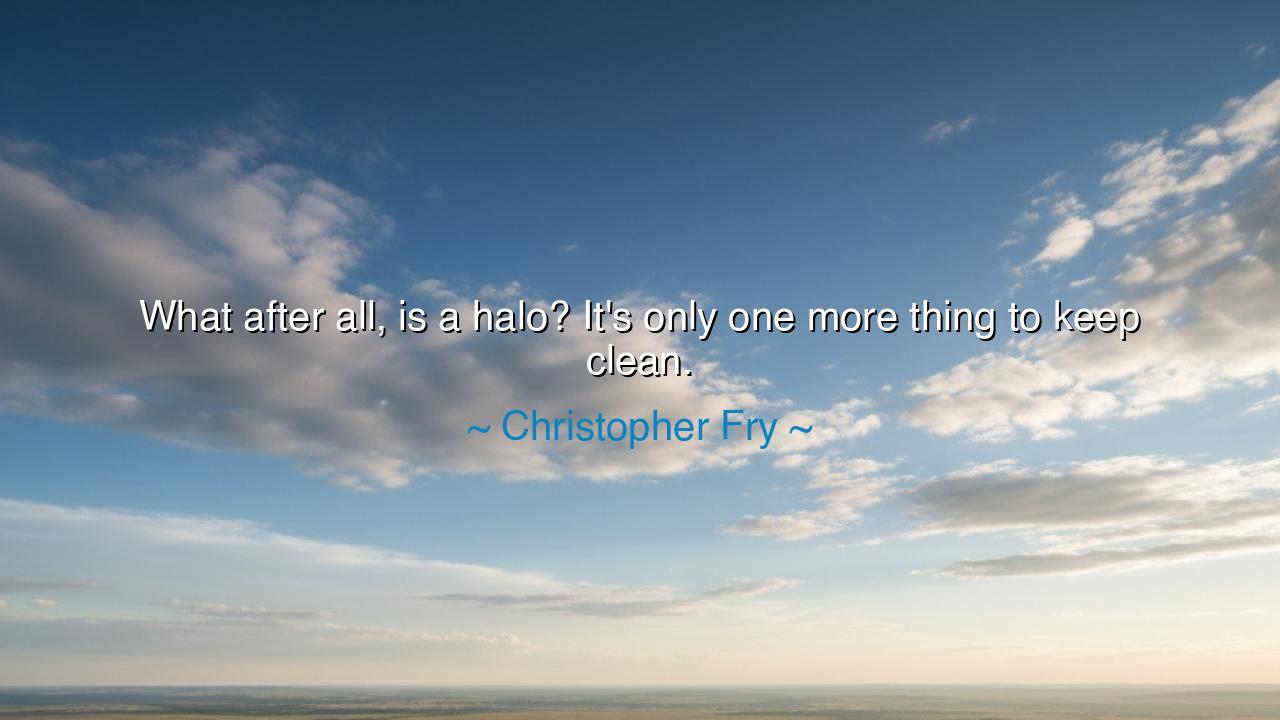
What after all, is a halo? It's only one more thing to keep






When Christopher Fry remarked, “What after all, is a halo? It’s only one more thing to keep clean,” he invited us to question the illusion of perfection and the weight of societal expectations. In this clever statement, Fry reflects on how the things we often see as symbols of virtue, status, or grandeur are, in reality, simply burdens to maintain. The halo, often depicted as a symbol of divine purity or saintliness, becomes, in Fry’s view, just another responsibility—one more thing to uphold, care for, and protect. Fry’s words are a wry commentary on the human desire to attain idealized images and the cost that comes with them. Rather than something that elevates, the halo serves as a reminder that the pursuit of perfection often brings with it added weight.
In the ancient world, philosophers often debated the nature of perfection and virtue. Aristotle, in his exploration of the golden mean, recognized that virtue lies not in the extremes but in the balance between excess and deficiency. Just as Aristotle warned against the pursuit of excess, Fry’s words warn us of the pursuit of ideals that, while seemingly elevating, can actually diminish our freedom. The halo, an emblem of purity and divine grace, becomes a symbol not of liberation, but of restraint—a reminder that the higher we aspire, the greater the maintenance of those aspirations. The weight of a halo, much like the weight of an ideal, becomes something that must be constantly managed.
The origin of Fry’s quote lies in the broader context of human aspirations. Fry, a playwright and poet, often infused his works with an awareness of the tension between the ideal and the real. His remark about the halo exposes a deeper truth: that society's pressure to maintain an image of perfection can actually constrain the very freedom it promises. In the pursuit of virtue, we often overlook the responsibility that comes with it. This realization is not a rejection of virtue itself, but an acknowledgment that striving for idealized versions of ourselves can lead to frustration, as we attempt to sustain a perfect image rather than embrace our authentic selves.
This critique of perfection can be traced to historical examples where societal ideals have created burdens rather than liberation. Consider the story of King Midas, who, in Greek mythology, was granted the wish to turn everything he touched into gold. At first, Midas reveled in the power of his gift, but soon realized that his perfect wealth was more of a curse than a blessing. What was once a symbol of prosperity became a source of tragedy, as even the simplest pleasures became unattainable due to the golden touch. The story of Midas is a parable for the danger of striving for ideals without considering the practical consequences. Just like the halo, the desire for perfection can weigh us down, turning what should be a symbol of honor into a symbol of burden.
Fry’s quote also reflects on the human condition, reminding us of the fleeting nature of perfection and the limitations it imposes. The halo as a symbol represents an unattainable standard of divine perfection—a goal so lofty that its pursuit may ultimately lead to frustration rather than fulfillment. Perfection, like the halo, can become something to keep clean, constantly requiring maintenance and care in a way that drains the individual. In seeking perfection, we may find ourselves lost in the effort to maintain an image, at the cost of living a truly fulfilling life. The halo becomes a reminder that idealization often clouds the richness of human experience.
The lesson from Fry’s statement is profound: that the pursuit of perfection, though alluring, often burdens us with responsibilities that detract from the joys of life. Real beauty lies not in the ideal but in the imperfections that make us human. It is through embracing our flaws and authentic selves that we find true peace, rather than in the relentless upkeep of a perfect image. Fry’s humor subtly invites us to let go of unrealistic expectations, to embrace the messiness of life, and to focus on what truly matters. Rather than striving to maintain the idealized image of the halo, we are called to live fully and freely, recognizing that our imperfections are a part of our unique and beautiful journey.
Practical actions to take from Fry’s wisdom:
-
Let go of perfectionism: Recognize that striving for perfection can be exhausting and ultimately counterproductive. Instead, embrace imperfection and focus on progress.
-
Focus on authenticity: Rather than maintaining an idealized image, seek to express your true self in all aspects of your life.
-
Embrace the flaws: Understand that imperfections are part of what makes us human. Instead of hiding them, celebrate them as part of your journey.
-
Live in the present: Focus on the here and now, rather than constantly striving for an idealized future. Seek fulfillment in the process, not just the goal.
For as Christopher Fry wisely reminds us, the pursuit of perfection—whether symbolized by a halo or an unattainable ideal—can often burden us with unrealistic expectations. Instead, it is in embracing our true selves, with all our imperfections, that we find peace and fulfillment. Perfection, when sought relentlessly, can trap us in a cycle of maintenance, but in imperfection, we find the freedom to live fully and meaningfully.






AAdministratorAdministrator
Welcome, honored guests. Please leave a comment, we will respond soon